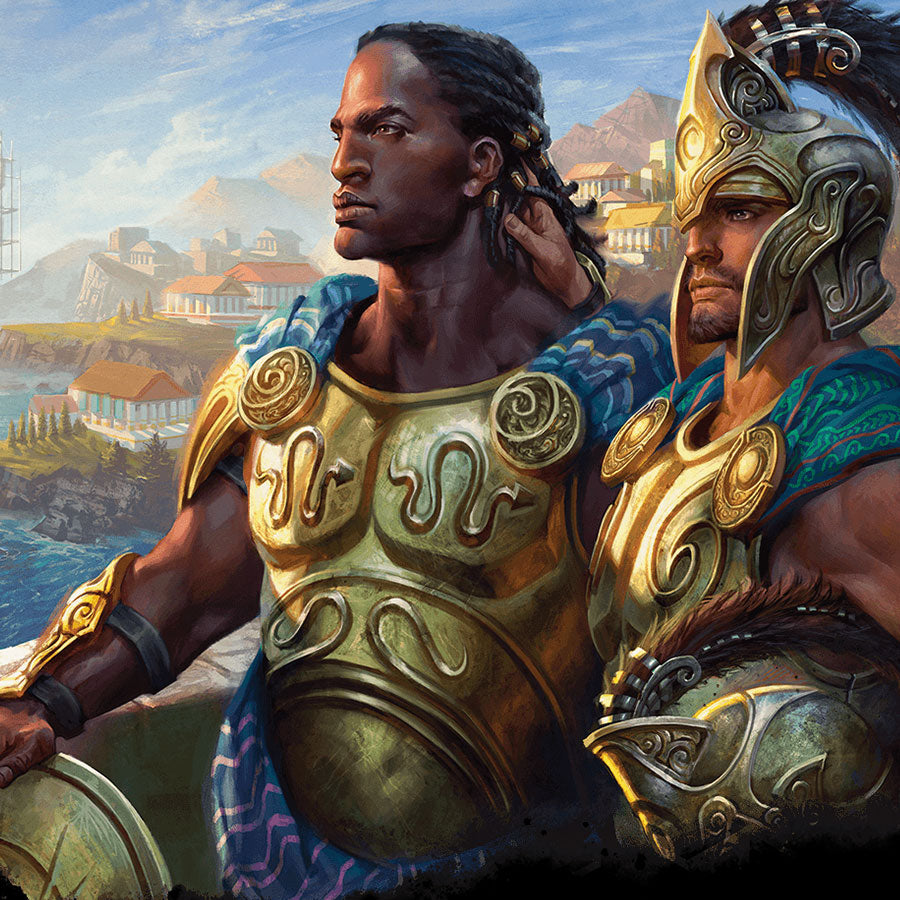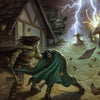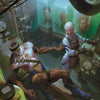The Dark Side of Paid Game Mastering

Written by Luke Hart
When I first started playing RPGs nearly 30 years ago, I was the game master, and I ran the games for FREE for my brother and my friends. It never occurred to me to charge them; after all, we were just playing a game. Fast forward to just a few years ago, and I began running paid RPGs through my Patreon. And to this day, our Ancient Dragon game is going strong, we are currently playtesting my Escape from the Fey adventure module, and my patrons are thoroughly enjoying themselves.
And yet, there is a raging debate among RPG fans about whether or not game masters should charge players. Is it okay…or is it an abomination, a plague upon our hobby? So, today, we’re going to delve into that debate. I’ll discuss why I believe paid game mastering is okay – with a few caveats – I’ll address some of the common objections to paid game mastering, and we’re going to talk about an ugly truth… the Dark Side of paid game mastering.
Watch or listen to this article by clicking the video below.
Why paid game master is okay
1. Game masters provide entertainment.
If you look at our society and consider what people prize the most – and to do that, let’s look at what we spend our money on – we will invariably conclude that it’s entertainment in one form or another. We spend billions of dollars on movies, video games, sporting events, music, Netflix, cable television – well, cable TV is going the way of the dinosaur, but that’s neither here nor now – and other forms of entertainment. And if you look at who in our society is the most highly compensated, it’s the actors, athletes, musicians – people who provide entertainment.
And then if we ask ourselves, “what do game masters do?” and boil it down to one general concept, we are left with the idea that a game master’s principal role is to facilitate fun at the game table. In other words, their “job” is to provide entertainment to the players.
Now, when you go to a movie, how much does it normally cost. Let’s say it’s a family of four. You have four tickets at $15 each, a bucket of popcorn at $15, and four drinks at $5 each. That’s right about $100 for under two hours of entertainment – assuming the move doesn’t suck, because at least half of the movies I end up seeing do indeed suck. Don’t even get me started on Star Wars… And this is a price that millions of people are willing to pay to be entertained.
And yet, when a game master, who also provides entertainment, wants to charge their players for said entertainment, folks get up in arms? I would argue that a good roleplaying game is AT LEAST as fun as a good movie, if not MORE FUN. And it’s usually FOUR hours of fun, not just two. If four people will pay $100 to see a movie that lasts two hours, what is so wrong if a GM charges a group of four players $200 per game session? If you’re calculating fun per hour per person, it’s the same thing as going to a movie.
For instance, if we go to StartPlaying – that’s a site where GMs can host games for a variety of systems, and then players can then pay to play in them – many of the games are somewhere around $20 to $25 per player per session. That’s WAY CHEAPER than going to a movie when you consider you’re getting roughly four hours of entertainment.
2. Paying to play ensures a quality game.
Well, I mean, at least it SHOULD. There’s always a chance that you play to pay in a game that isn’t really good or completely sucks. And if that happens, you just don’t pay anymore – at least, not with that game master. It’s like going to a crappy movie, like the recent Star Wars trilogy that Disney totally botched – sometimes you just get screwed. But it doesn’t mean that movies in general are bad, just those particular ones you went to. Anyway, the point here is the idea that if you are PAYING to play in an RPG, there is the expectation that it is FUN and worth the money, and that the GM is going to put in the effort needed to ensure that. For instance, in my Ancient Dragon game for my patrons, I do my very best to ensure they enjoy the experience. They are paying me to play, and I feel it is my DUTY to give them an awesome game.
Now, of course, if you’re a player who is considering paying to play in a game, you ideally want to have a way to ensure that you’re in fact getting into a quality game before you folk over your money. So, I recommend using services that can give you some sort of indication in that regard.
For instance, if we look again at StartPlaying, there is a mechanism for players to RATE game masters and leave their feedback. And then, when you are considering joining a game, you can get information about the game, the game master, see player testimonials, and other information that gives you a way to gauge whether a game and a game master is a good fit for you or not. In other words, you don’t have to go in blind.
3. Game Mastering requires a time commitment beyond that of being a player.
Look, players mostly just show up to the game table and play the game. Sure, you might argue that GOOD PLAYERS prepare in advance – they brush up on what happened in the last game session so they are not lost; they review their character’s abilities and spells so that game play is smoother – but let’s be honest for just a moment: how many players do YOU KNOW that actually do that? And how many just show up and are a bit lost for awhile?
A game master can’t really do that. Well, I mean, they technically CAN, but then their game would probably suck, and their player turnover rate would be through the roof. The fact of the matter is that most game masters spend some amount of time preparing for their games OUTSIDE of the game session. How much varies, of course, but for the sake of making this point, I’ll just talk about my experience. For every 1 hour that I run an RPG during a game session, I spend AT LEAST 1 hour in preparation. That preparation involves a variety of things which are out of scope for this article, but suffice it to say that the amount of time is not negligible. So, then, if a GM must spend time outside of the game session, time above that of a player, the logic goes that perhaps they should be compensated for that time.
4. Game Masters are in short supply.
Here’s another fact for you: the number of people who want to PLAY in RPGs is WAY HIGHER than the number of people who are willing to be GMs. This leads to lots of players looking for games but unable to find them because there aren’t enough GMs. Now, if we apply economic principles here, when something is in SHORT supply but HIGH demand, that increases the value of said commodity by leaps and bounds. So, since game masters are so valuable, what’s so wrong if some of them want to be paid for providing a valuable service to players?
Furthermore, game masters being paid ENCOURAGES folks to become game masters and run games, helping relieve the problem of finding games to play in. The same principle applies in the workforce, if we equate GMing to a job: unsavory or difficult jobs are often paid more than desirable or easy jobs because it encourages folks to take those jobs.
5. Being a good game master isn’t easy.
Anyone who has been a game master before can tell you that it can be challenging. Not only are you designing game elements in advance of the session, but you then need to run the game session, balancing a variety of items simultaneously. It can be overwhelming at times, and to top it all off, it often falls to GMs to deal with personal conflicts and player issues that arise at the table. Look, in my previous point we talked about how GMs are in short supply: why do you think that is? Because it’s not easy. And, furthermore, being a GM – being a good game master – requires skill and expertise often learned over YEARS of experience. Doesn’t it make sense that they might be compensated for this? I mean, who goes to a doctor who has gone through a decade or so of education, time in residence, gone in debt up to their eyeballs, and has years of experience in the practice and asks them to do it all for free? It’s not free, of course; you pay for it one way or another, whether directly out of pocket or through your taxes.
Why some people believe paid game mastering is wrong
1. Charging to play is a barrier to entry and not fair to players.
The gist of this objection to paid GMing is that not all players have money to pay to play and that charging them would limit accessibility to RPGs and could be considered gatekeeping. Furthermore, it discourages players from joining the hobby when they need to pay to play.
Now, while on the surface this line of reasoning seems to hold water – and uses a couple buzzwords designed to win arguments through emotion and outrage instead of reason – I don’t think this objection really works. If it’s wrong for a GM to charge players to play in their game, is it wrong for gaming companies like Paizo to charge for their books? Is it wrong for Roll20 to charge for their platform? Is it fair for local gaming shops to charge people for miniatures and paint supplies? Should all Dwarven Forge terrain be completely free?
Because one could quite easily argue that these companies charging players and game masters for those products is also limiting accessibility and gatekeeping. And is it right for movie theaters to charge for popcorn and tickets? Should we have to pay to attend professional sporting events? You see, unless your argument is that EVERYTHING EVERWHERE should be free, this objection to paid GMing just doesn’t hold up. Most things in this world have a price, and if you want a thing, you need to be willing and able to pay that price. And the people who provide those services and create those products need to pay rent and buy food just like you and me. It’s just the way the world works. Now, we can throw around words like accessibility and gatekeeping to win arguments, but it doesn’t change the fundamental nature of things.
Of course, there is nothing wrong with GMs running games out of kindness of hearts. I only have ONE paid game, and I run two other games completely free. So, for those game masters who wish to run their games for free BECAUSE they want to encourage players to join the hobby and remove as many impediments to that as possible, I think that’s wonderful. However, it shouldn’t be used as an objection to paid GMing, because it’s just not logical.
2. Roleplaying games are a hobby; you shouldn’t have to pay for them.
The argument here is that game mastering is NOT a professional service, it’s something you do as part of a hobby; therefore, you shouldn’t charge for it. First, I think we can all agree that most hobbies carry a cost. How many hobbies exist that are 100% free that require you to buy absolutely nothing? I’m sure there are some, but probably not too many.
Next, let’s address the idea that game mastering is NOT a professional service. When you think of professionals who charge for their services, there are a few common characteristics: they are experienced and skilled at what they do, and what they do carries value for the person receiving their services. A good doctor is skilled and experienced, and the patient receives value from the doctor – that is, the patient gets better. A good game master is also skilled and experienced, and their players receive value from them: several hours of fun and entertainment. So, this objection just doesn’t work for me.
3. Charging to play is not in the spirit of the game.
Now see, this objection doesn’t really make much sense to me, so I’m probably not going to be able to address it adequately. The best I can gather is that the “spirit of the game” is that of friends gathering around a table to play an RPG; and the motivating factor should be friendship and camaraderie, not money. And you know, I think there is some truth to that… so long as we define THAT specifically as the “spirit” of the game. However, I don’t think it’s fair to require everyone to accept that definition as the spirit of the game. RPGs mean different things to different people, and trying to apply a one-size-fits-all definition of what an RPG should mean to everyone is doomed to fail. You might feel paid GMing is a corrupting poison; however, others will see it as a way to ensure they get into a good game and have fun instead of banging their head against the wall as they bounce from one crappy game to another, trying to find one that doesn’t suck – and, wasting their time as they do so.
4. Game mastering isn’t that hard and charging to play isn’t justified.
Okay, I have two responses to this: First, if you are someone who has never GMed before, and you believe this, you need to be a game master for a few months to a year, and then get back to me. I think your opinion may have changed. Or, if you are a game master, and you’ve been doing it for a spell, then you probably feel like it isn’t that hard because you have experience and have become good at it. However, that only means it isn’t hard FOR YOU; I assure you, many others don’t feel the same way. Trust me, there is a REASON that many players never want to be game masters.
The Dark Side of being a paid game master
Despite there being nothing WRONG with game masters charging to play in their games, there is a dark side to paid GMing. It’s not all sunshine and moonbeams; there is a price to be paid.
The first is that there is more pressure to perform. Look, when you know your players are PAYING for your game, you cannot help but feel a degree of responsibility to deliver a fun and satisfying game session. I personally know that I feel this responsibility for the game I run for my Ancient Dragon patrons, though it doesn’t really affect me too much insofar as I don’t feel pressure or anxiety because of it. The same may not be true for others. I know that even being a GM can induce anxiety for some; if you throw in the added stress of knowing that players are paying for the game, it could get even worse.
Next – and this is a downside that I personally have struggled with – being a paid GM can feel more like work than fun. And when game mastering starts to feel like a job, and you’re no longer reaping enjoyment from it, it can steal your motivation and perhaps even decrease the QUALITY of your games. This can be detrimental when your players are paying, of course, and have certain completely justified expectations regarding game quality. I would say that for about 6 months or so I went through a time when my Ancient Dragon game ceased to be fun for me, and it really just felt like work. I don’t know if my players noticed or not – I did try to put on the best game I could – but for several months I was just punching in and punching out, as the saying goes.
Now, this was back when I had a full-time job while also running my YouTube channel, doing Kickstarters, and creating a monthly RPG magazine. Even though I had an amazing team helping me do all that, I was still incredibly busy. Too busy. And running a game just felt like another item on my task list to get checked off. I’m happy to say that I no longer feel that way, and that I am once again really enjoying my Ancient Dragon game.
For me personally, part of the solution was quitting my day job so that I had more time to do everything; that took a lot of the pressure off. However, I also spent some time doing some personal introspection, considering WHY I run games and WHAT I find enjoyable about GMing. I was able to get back in touch with what I love about GMing and re-connect with that passion for my Ancient Dragon patron game.
However, all of that said, I consider it an absolute blessing to get paid to do something I love AND be part of delivering hours of entertainment to my players.
The Ultimate 5e Anthology for DMs
Lairs & Legends 2 and Loot & Lore 2 are the ultimate game master resource! These two massive books put an anthology of everything you need to run amazing games for YEARS at your fingertips.
- Over 30 Adventures
- 30 Stand-Alone Encounters
- More than 100 Monsters
- Traps and Puzzles
- 6 New Rule Sets
- And much more!
These books are written to make running the game easy for new and veteran GMs. Each resource is built with intuitive formatting, clear wording, and evocative art. You’ll never again have to dig through dense paragraphs to find critical details you need during a live session.
These 5e resources are designed to scale to your needs, whether it’s a quick drag-and-drop trap to add some spice to your session or complete adventures that span levels 1 to 20. The sky’s the limit with what your games can become with Lairs & Legends 2 and Loot & Lore 2.
-
Posted in
Game Master How-To Articles






